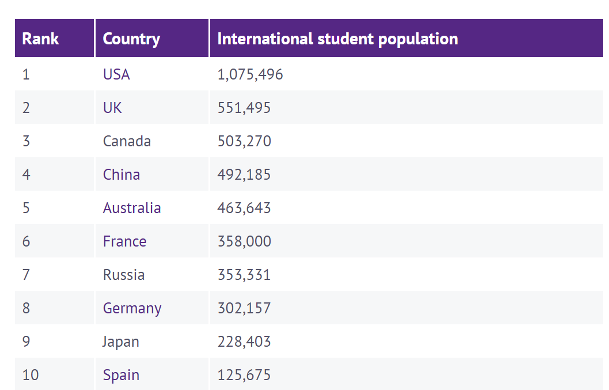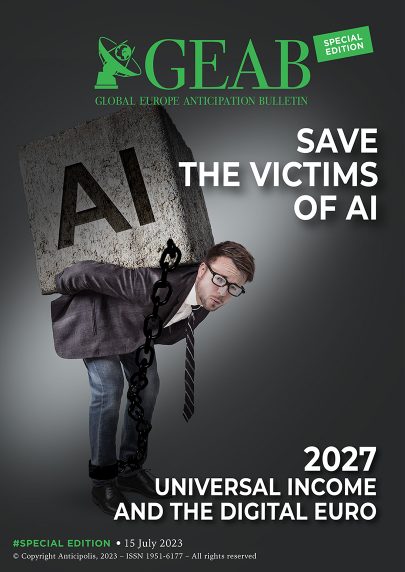GEAB July 2023
Fabienne Goux-Baudiment has a degree in political science and a doctorate in social sciences. She is the managing director of SAS, a study, research and consultancy centre in the field of foresight, proGective .
Her main activity is to support public and private sector decision-makers in their future-oriented thinking and initiatives, both in France and abroad. To illustrate the theme of this July’s special issue, we have gathered her views on her experience of HR issues.

We are in the midst of a major transition in which the very foundations of our system are crumbling. Not just work, but also individuals, societies, ways of being in the world, relationships between individuals, etc. We are experiencing a phase of overlap between the world that is emerging and the world that is disappearing, all the while trying to resist. It is this tension that creates the current upheavals (crises).
21st Century Talent
Until now, those who were capable of mastering knowledge at a higher level than others were considered to be talented, and they enabled the great advances of today’s civilisation. For example, almost everyone is required to have a bachelor’s degree (+3): you don’t start to stand out until you have a master’s degree (+5). This is characteristic of a system of elite reproduction in which knowledge can be capitalised on.
Today, however, we are seeing the emergence of people who are not necessarily academically brilliant, but who know how to deal with uncertainty, who are able to understand the complexity of the world and multiculturalism. This time, understanding comes not from acquired knowledge, but from innate knowledge, an aptitude. I make a distinction between the ability to acquire skills, which have been progressively defined over generations, and natural aptitudes. Until now, the latter have only been valued through sport and perhaps the arts. Generally speaking, if you run faster than others, it’s not just because you’ve trained more, but because you have a physical constitution that allows you to reach such a level.
So we’re beginning to realise that the talent that companies need is exactly that: people who have not been shaped by an education system that makes them intellectually rigid, impervious to novelty and alternatives. A system that standardises and excludes. But as soon as we think in terms of aptitudes and neurodiversity, we see that difference can only enrich. We can no longer follow the logic of reproducing knowledge, because the more you reproduce, the more you diminish the uniqueness of the individual, his difference, his particularity. On the contrary, if you want to encourage talent, you have to nurture difference.
The Arrival of the Alien Generation in the Geopolitics of talent
We are witnessing a schism within the generations born from the late 80s onwards, an unprecedented rupture. This is different from the usual generation war, which implies a paradigm shift. All over the world, for example, the values of authority, obedience and family cohesion are imploding…. These young people, the Alien Generation,[1] have a logic of extreme ease, rejecting drudgery, seeking total freedom, fear of boredom, exacerbated need for justice… They are characterised by a great ignorance of traditional concepts and traditional basic knowledge, but a very strong creative capacity. So what we now call “talent” is what we used to call “creative minorities” (A.J. TOYNBEE). Except that they are no longer a minority within the Alien Generation. To my mind, this is the major break: this difference in conception between what has been called talent for almost two millennia and what we are now seeing emerging as talent.
Increasing access to Artificial Intelligence (AI) adds another dimension to this trend. AI has been trained (coded) to be vertical. And today you have some quite extraordinary AIs. I’m thinking of Watson Health[2] in the field of oncology, which is doing a remarkable job because it can detect in two days a little-known cancer that would have taken a human a year to detect. Why would you want to burden humans with these analyses if Watson is capable of doing them even better? This raises the question of what humans can offer in terms of added value. What these young talents can do that an AI is not capable of: tackling the global level. The AIs we have today are specialised AIs. As for us – by which I mean Humans – our ability to think lies in the fact that we can link together information which, a priori, does not fall within the same lexical or cognitive field. This is known as the association of ideas.
My generation was trained to absorb knowledge through linear sequencing. In other words, you read a word, a letter, you hook it up to the next one, and you always go from left to right (or vice versa). Alien Gen’, on the other hand, work with a “plex“. Imagine a big white canvas in your head, on which you put post-it notes; you stick them anywhere, it doesn’t matter, because it’s not linear at all.
In a sequential process, you’re in a tunnel, you must get to the end to see the end. In the Alien Gen’ cognitive process, ideas are laid down on the plex and then, all of a sudden, they link up. But how? But why? We don’t know. What we do know is that this is only observed in young people who began acquiring knowledge before going to school, usually through a video game. And that’s the break we haven’t yet realised: it’s no longer skills but aptitudes that are being developed under the impact of evolution. The gap between the generations who have been trained to acquire skills in a sequential process, and the natural aptitudes of these Alien Gen so complicated to grasp, makes dialogue and therefore management extremely difficult. And yet it is they who bring us the innovation and creativity we are going to need to face up to the Great Transition.
In relation to AI, what needs to be emphasised is that this uniqueness resulting from the triple combination of skills, competencies and personality cancels out the competition with AI, because AIs are not unique. What’s more, this talent profile knows how to work with AI and ask it the right questions. What’s even more interesting is learning how to work with AI. That’s the main challenge of the future. And these young people are in the process of meeting that challenge.
The Three Breaks in the Geopolitics of talent
Why are we talking about the geopolitics of talent today? This issue has been around for twenty years. I can identify three elements of change: the arrival of a new population from emerging countries on the global labour market; total digitalisation; and a change in the balance of power between countries that attract talent. Each of these elements involves significant changes, but they have not lasted long enough to be described as structural.
With regard to the first, more and more countries have moved from the underdevelopment stage to the ‘indevelopment’ stage. This progress concerns not only GDP but also education. These countries are producing an increasingly well-educated population, both in terms of quantity and quality. Obviously, this newly educated population is entering the world labour market, because the emerging countries do not offer a sufficient labour market to absorb this population, which is already in excess of the country’s equilibrium. Because of this mismatch, this population must be absorbed elsewhere. For the rest of the world, this means that competition is spreading and intensifying. As a result, this generalisation is calling traditional education systems into question, as talented people enter the labour market of talents who have not followed a traditional Western curriculum.
Secondly, today the world’s population has almost total access to the Internet.[3] The first consequence of this is the growth of the gig economy, which is developing everywhere. On the Upwork.com platform, for example, almost 100,000 job offers are registered every second on the global market. Although this is language-dependent, globally you can respond to any job offer from any country. The second consequence is the notion of the quaternary. Traditionally, activities are divided into three sectors: primary (exploitation of natural resources), secondary (industrial activities) and tertiary (services). Today, we are adding the quaternary, which for a long time was reserved for highly intellectual professions: teachers, professors, accountants, computer specialists, etc. We now realise that many people can carry out a wide variety of jobs remotely without having to have an extremely high level of knowledge, whether it be administrative tasks, maintenance, surveillance, monitoring, etc.
Finally, in the wake of Covid, teleworking has developed to the point of creating a new schism between companies that are desperate to get employees to return to their premises and employees who are desperate to work where they want. The problem is that our educational and professional structures are not adapted to teleworking, i.e. we don’t teach a child today to be perfectly autonomous at a distance. The mismatch between traditional and emerging systems is now obvious.
The third element is the countries that attract talents, where there has been a twofold shift. Firstly, there has been a shift from brain drain to brain gain. The first began in the aftermath of the last world war, when certain countries attracted intellectual populations from other countries in order to train them; very often foreign students stayed on, leaving their countries of origin with a skills deficit. Then, in the 2000s, brain gain began, i.e. the return to the country of origin of people trained abroad (India, China). We are only at the beginning of this movement, but it is now a major challenge for sending countries to make use of diasporas, to bring back young people, to offer them quality jobs and career prospects.[4]
The second change is the shift in the countries which are attractive. Until now, the most attractive countries have been the United States and the United Kingdom, Australia, Canada and France… The value of being a magnet lies in the return on investment that the foreign student can bring you, through patent applications, intellectual and cultural influence (the student is intellectually formatted by local standards), and cooperation: once back in their own country, the student will tend to cooperate more easily with the country where they studied.
But we are now seeing growing numbers of foreign students, particularly from emerging economies, going to China, South Africa and Russia. And it’s not just young people from emerging countries. More and more young French students are doing part of their studies in China, as are a number of Americans. So, there is indeed a new attraction in the market, but in the current post-COVID era it is difficult to predict the future, not least because the resurgence of geopolitical tensions between the West and China could dry up this growth. It should not be forgotten that China’s main attraction, apart from the quality of its education, is its tuition fees, which are much lower than in the United States. But price competitiveness is becoming increasingly important.[5]

Figure 1 – Ranking of the most popular destinations for international students. Source: Studee, 2020
Global Systemic Risks
Let’s not forget that all these changes will take place in a multipolar world. Until now, when we tried to understand the changes, we first looked at what was happening at home. Today, we need to look at the non-Western world. Another major upheaval will be the demographic collapse from 2050, 2060 at the latest. If the growth of the world population was difficult to manage, the decline is likely to be much more complicated.
Lastly, among the upheavals that are difficult to anticipate, the one that has loomed largest since the last world war is that of a real war (far more dangerous than a blackout, a lasting Internet blackout, a threat to global mobility, or anything else). Without necessarily going as far as the global stage, a confrontation between China and the United States, a conflict with Russia that would extend beyond Ukraine, or even a China-India conflict that would become Indo-Pacific… cannot be ruled out. Some of the current tensions are very serious. I began my career in polemology. I’ve been lucky enough to live almost all my professional life without (at any point) seeing the possible emergence of a third world war. That has changed very recently. Until now, the likelihood of a world war was easy to see, because we lived in a bipolar world. A world war in a multipolar world is a completely different matter.
Join also the GEAB Community on LinkedIn for more discussions on this topic.
______________
[1] Source: Linkedin – Fabienne Goux-Baudiment, 18/02/2020 “Alien” because these people present a new and different evolution. In this article, the author defines the concept as follows: “The appearance of the Alien Gen cannot be precisely dated. However, the forerunners and the followers are framing an event: the widespread use of digital tools and access to them by the youngest members of society. The spontaneous mastery of such tools, long before traditional cognitive processes were acquired, led these children to create a plex, a mental space in which the different parts are not definitively housed in given locations, contrary to the ordering provided by the sequential cognitive system.
[2] Bought out in 2022 by Francisco Partners and since then operating under the name of Merative
[3] Source: CoMarketing-News, 26/01/2022
[4] Source: Welcome to the jungle, 13/03/2019

International relations and geopolitical tensions are fuelled by a myriad of factors, the most well-known of which is access to mineral resources and agricultural products. The microprocessor war reveals new [...]
From agriculture and printing press to the Internet, all technological advances have had socio-economic consequences, leading to profound changes in society. Easy access to the power of artificial intelligence will [...]
This is one of the most serious crises facing the space sector, particularly in the West, and it will determine the future balance of powers. Already listed as one of [...]
Artificial Intelligence: Jump on the bandwagon! After offering you several anticipations and analyses on the future challenges of AI in this issue, our team would now like to take a [...]

Comments